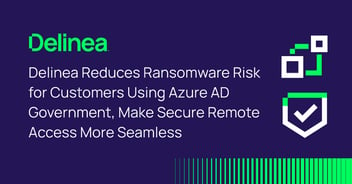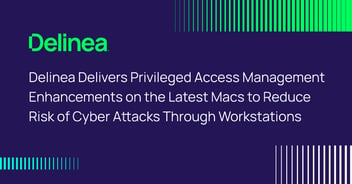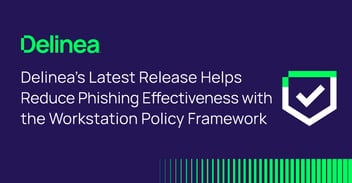Delinea Debuts Privilege Control for Servers: A New Era in Thwarting Stolen Credentials and Lateral Movement

Brad Shewmake
San Francisco, CA — March 5, 2024 – Delinea, a leading provider of solutions that seamlessly extend Privileged Access Management (PAM), today announced the introduction of Privilege Control for Servers on the Delinea Platform, enforcing least privilege principles on critical systems consistently across identities to combat stolen credentials and restrict lateral movement. The Delinea Platform combines enterprise vaulting, VPN-less privileged remote access, and privilege controls to enforce just-in-time and just enough privileges to provide a more secure, resilient, scalable SaaS solution that expands with an organization’s needs. Delinea is changing how organizations enforce privilege as the new perimeter of security to reduce risk, more easily meet compliance, and improve productivity on a single unified cloud-native platform.
According to Verizon’s 2023 research, stolen credentials were involved in nearly half (49%) of the breaches last year A report from Sophos indicates that the average ransomware payout escalated dramatically from $812,380 in 2022 to $1,542,333 in 2023, highlighting the increasing financial stakes for victims. Organizations need a multi-layered security approach to limit privileges so that if credentials or identities are compromised, they can limit the impact of ransomware and other threats.
Prevent lateral movement to contain cyber incidents
As part of the Delinea Platform, which provides seamless and easy-to-deploy PAM, Privilege Control for Servers centrally elevates privileges on Active Directory identities as needed to limit standing privileges, enforcing least privilege best practices. Customers can limit shared credential sprawl and manage privileged access to Windows, Linux, and Unix servers in hybrid cloud environments, which are enforced on the machine, limiting lateral movement. Customers can enforce Multi-Factor Authentication (MFA) at vault log-in, credential access, server log-in, and privilege elevation using MFA at depth, providing identity assurance to mitigate the risk of compromised credentials or identities and meet increasing regulatory and cyber insurance requirements.
For remote workers and vendors, VPN-less and agentless privileged remote access provides a secure means of accessing critical resources and data, whether using a vaulted credential or an Active Directory identity, without ever seeing or entering a credential. Privileged activities are consistently authorized based on policies, and remote sessions are recorded and audited.
In Privilege Control for Servers, session recording and auditing occur on the host, so data cannot be altered. As a shared capability, session, and audit data is unified and saved in the Delinea Platform, simplifying storage and access while taking advantage of Delinea’s innovative AI-driven auditing (now in public preview) to dramatically reduce the time to identify potentially dangerous activities without manually reviewing hours of session recordings.
“Threats like ransomware continue to evolve, and organizations need to reduce the risk of stolen credentials and lateral movement drastically. As identities and environments become more complex, privilege is the new perimeter of security,” said Phil Calvin, Chief Product Officer at Delinea. “The introduction of Privilege Control for Servers adds even more robust authorization to the Delinea Platform, the first cloud-native unified PAM platform that is more secure, resilient, and scalable than other solutions.”
Enforcing privilege as the new perimeter with the first unified cloud-native PAM platform
Privilege is the new perimeter of security for modern enterprises. Privilege Control for Servers provides deeper and more robust privilege protection as part of the Delinea Platform. Customers can layer security defenses on privileged activities with Secret Server for shared credentials, privileged remote access, and privilege controls to more effectively prevent credential theft and the ability to access critical data and infrastructure. Built using modern cloud architecture, the Delinea Platform is more resilient, with multiple redundancy levels that automatically ensure the availability of all capabilities with contracted 99.99% uptime and zero-time upgrades to ensure privileged access is always available. Shared capabilities like continuous discovery, policies, MFA at depth, auditing, session recording, integrations, and AI-driven analytics simplify administration. Delinea can quickly and constantly provide our customers with updates, enhancements, and innovations to address their needs and respond to evolving threats safely and reliably using modern DevOps practices.
Privilege Control for Servers sets the direction for enforcing just-in-time and just enough privileges through the Delinea Platform. As solutions are added to the platform, they will adopt this naming convention (Privilege Control for [Use Case]) to help customers easily identify the solutions required to meet their unique Privileged Access Management and identity security requirements.
To learn more about Privilege Control for Servers on the Delinea Platform, visit https://delinea.com/products/privilege-control-for-servers.
About Delinea
Delinea is a leading provider of Privileged Access Management (PAM) solutions for the modern, hybrid enterprise. The Delinea Platform seamlessly extends PAM by providing authorization for all identities, granting access to an organization’s most critical hybrid cloud infrastructure and sensitive data to help reduce risk, ensure compliance, and simplify security. Delinea removes complexity and defines the boundaries of access for thousands of customers worldwide. Our customers range from small businesses to the world's largest financial institutions, intelligence agencies, and critical infrastructure companies. Learn more about Delinea on LinkedIn, Twitter, and YouTube.
© Delinea Inc. 2024. Delinea™ is a trademark of Delinea Inc. All other trademarks are property of their respective owners.



